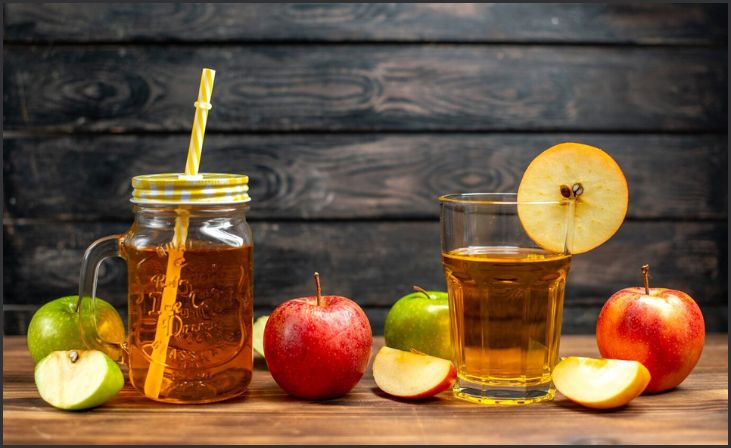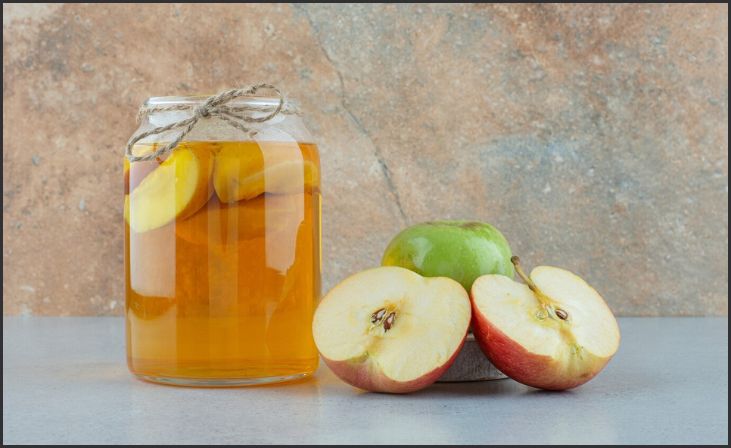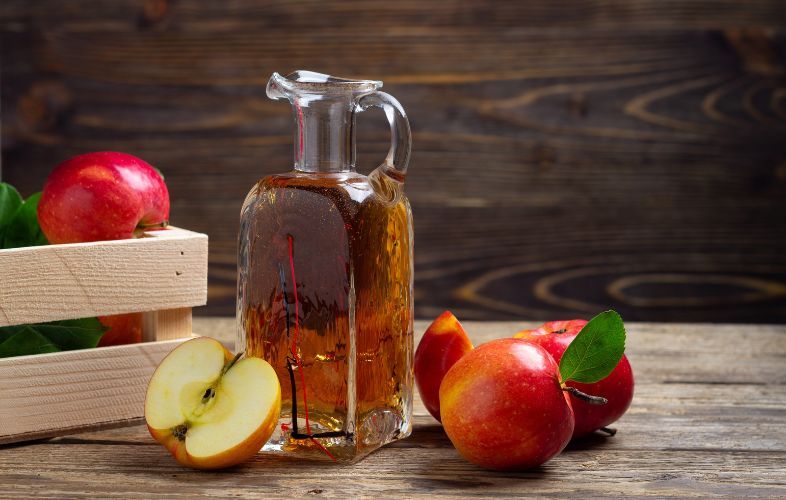Apple cider vinegar (ACV) has risen to prominence as a versatile elixir, celebrated for its myriad health benefits and diverse culinary applications. As a product of fermented apple juice, ACV contains acetic acid, enzymes, probiotics, and essential nutrients.
Given its growing popularity, questions about its shelf life and potential expiration have become pertinent. In this exploration, we delve into the intricacies of ACV, examining its production process, composition, and the factors influencing its shelf life.
The primary focus is to decipher whether ACV indeed has a definitive expiration date and the telltale signs of spoilage. Understanding these aspects is crucial for consumers seeking to maximize the benefits of ACV while ensuring its safe and effective use in various daily practices.
Overview of apple cider vinegar (ACV)
Apple Cider Vinegar (ACV) is a fermented liquid derived from crushed apples, renowned for its multifaceted uses and potential health benefits. The production process involves crushing apples to extract their juice, which undergoes fermentation with the help of acetic acid bacteria and yeast. This fermentation process converts the sugars in the apple juice into acetic acid, the primary component responsible for ACV’s distinctive tangy flavor.
ACV is celebrated for its rich nutritional profile, including enzymes, probiotics, and trace amounts of vitamins and minerals. The acetic acid content is a key feature, contributing not only to the flavor but also believed to offer various health advantages. ACV has gained popularity for its potential roles in aiding digestion, supporting weight loss, and promoting skin health.
Beyond its health-related applications, ACV is a versatile ingredient in culinary practices, adding depth and acidity to a range of dishes, dressings, and beverages. Additionally, it has found a place in beauty routines, serving as a natural skincare and haircare product.
While ACV has become a household staple, understanding its production, composition, and potential benefits is crucial for maximizing its use in both health and culinary contexts.
Also, Read – Best Types of Fish to Eat
Understanding Apple Cider Vinegar

Understanding Apple Cider Vinegar (ACV) involves exploring its production process, composition, and various applications. Here’s a breakdown of key aspects:
- Production Process:
- Crushing Apples: ACV begins with the extraction of juice from crushed apples.
- Fermentation: The apple juice undergoes fermentation, where sugars are converted into alcohol by yeast.
- Acetic Acid Formation: Acetic acid bacteria then further ferment the alcohol into acetic acid, giving ACV its characteristic tangy taste.
- Composition:
- Acetic Acid: The dominant component, responsible for the sharp flavor and believed health benefits.
- Enzymes: Natural compounds that support various biochemical processes.
- Probiotics: Beneficial bacteria that promote gut health.
- Vitamins and Minerals: Trace amounts that contribute to nutritional value.
- Health Benefits:
- Digestive Aid: ACV is thought to improve digestion and alleviate indigestion.
- Weight Management: Some studies suggest it may assist in weight loss efforts.
- Blood Sugar Control: Potential benefits in managing blood sugar levels.
- Antimicrobial Properties: ACV’s acidity may inhibit the growth of harmful microorganisms.
- Culinary Uses:
- Salad Dressings: A popular ingredient for vinaigrettes and dressings.
- Marinades: Adds flavor and tenderizes meat.
- Preservation: Historically used for pickling and preserving food.
Shelf Life of Apple Cider Vinegar
The shelf life of Apple Cider Vinegar (ACV) is influenced by several factors, and understanding how to store it properly is crucial for maintaining its quality. Here’s an exploration of the shelf life of ACV:
- Factors Affecting Shelf Life:
- Storage Conditions: ACV should be stored in a cool, dark place away from direct sunlight to prevent oxidation and maintain its quality.
- Temperature: Extreme temperatures, whether too hot or too cold, can impact the vinegar’s stability.
- Quality of the Initial Product: The source and quality of the apples used in production can affect the overall shelf life.
- Best-By Dates and Expiration Dates:
- Understanding Labels: ACV bottles often carry “best-by” or “use-by” dates. While these provide a guideline for optimal freshness, ACV doesn’t typically expire as it is a fermented product. It may, however, experience changes over time.
- Regulatory Standards: Compliance with industry and regulatory standards ensures that the product meets certain quality criteria up to the specified date.
- Signs of Spoilage:
- Visual Changes: Look for cloudiness, sedimentation, or changes in color, which may indicate spoilage.
- Aromatic Changes: ACV should have a characteristic sour smell. Any foul or unpleasant odor may signal spoilage.
- Taste: While ACV is naturally sharp, an unpleasant taste could indicate spoilage.
- Microbial Growth:
- Mold and Yeast Formation: If you observe any visible mold or notice signs of fermentation beyond what’s typical, it may be an indication that the ACV has spoiled.
- Extending Shelf Life:
- Proper Storage Tips: Store ACV in dark glass containers with airtight seals to minimize exposure to air and light.
- Refrigeration vs. Room Temperature: While refrigeration can slow down the process of oxidation, many people prefer storing ACV at room temperature for ease of use.
Also, Read – Chocolate Chip Cookies Recipes
Signs of Spoilage

Recognizing signs of spoilage in Apple Cider Vinegar (ACV) is essential to ensure its quality and safety. Here are key indicators that ACV may have spoiled:
- Visual Changes:
- Cloudiness: While some cloudiness is normal, an excessive cloudiness or the presence of sediment at the bottom of the bottle could indicate spoilage.
- Color Changes: ACV is typically amber-colored. Any drastic changes, such as a darkening or discoloration, may suggest deterioration.
- Aromatic Changes:
- Foul Odor: ACV has a distinctive sharp and sour smell. If it develops a foul or unpleasant odor, it may be a sign of microbial activity or contamination.
- Taste Alterations:
- Unpleasant Taste: ACV has a tangy and acidic taste. If it develops an off or unpleasant flavor, it’s an indication that the product may have undergone undesirable changes.
- Microbial Growth:
- Mold or Scum: Visible mold growth on the surface or scum forming within the liquid is a clear sign of spoilage. Mold growth can be green, black, or white.
- Yeast Formation: Excessive yeast sedimentation, especially if it looks unusual or has an unpleasant odor, may signal spoilage.
- Packaging Integrity:
- Leakage or Swelling: If the bottle shows signs of leakage or the packaging appears swollen, it could be a result of fermentation or gas production, indicating spoilage.
Benefits of Expired ACV

While consuming expired or spoiled food products is generally discouraged, some argue that certain fermented items, including Apple Cider Vinegar (ACV), may still offer benefits even after their “best-by” date. However, it’s crucial to exercise caution, and individuals should be aware that the term “expired” usually implies a decline in quality and potential safety concerns. Here are some considerations:
- Presence of Acetic Acid:
- ACV’s primary component, acetic acid, acts as a natural preservative. Even in an expired state, the acetic acid content might still inhibit the growth of harmful microorganisms.
- Continued Health Benefits:
- While the potency of certain compounds might diminish over time, expired ACV could still retain some of its healthful properties, such as aiding digestion and potentially supporting skin health.
- Non-Harmful Characteristics:
- Unlike perishable foods that may pose a health risk when expired, ACV’s acidity and fermentation process make it less prone to harmful bacterial contamination. In many cases, spoiled ACV might not be harmful but simply less effective or palatable.
- Beauty and Household Uses:
- Expired ACV may still find utility in non-consumable applications. It could be used in beauty routines, such as hair rinses or facial toners, where the antibacterial and acidic properties might still be beneficial.
Conclusion
In conclusion, while Apple Cider Vinegar (ACV) may retain some benefits after its best-by date, caution is essential. The presence of acetic acid can offer limited preservation, but signs of spoilage should not be overlooked. Consuming expired ACV might be less effective and potentially unsafe.
For non-consumable uses, such as beauty routines, expired ACV may still find some utility. Ultimately, prioritizing proper storage, regular inspections, and a commitment to freshness ensures optimal enjoyment of ACV’s versatile benefits while minimizing potential risks.
FAQs
ACV typically doesn’t have a strict expiration date. However, its quality may decline over time. Pay attention to signs of spoilage, such as changes in color, odor, or taste, to ensure it remains safe and effective.
Look for visual changes like cloudiness or sediment, alterations in color, and any foul odor or off taste. Mold or yeast growth is also a clear indicator of spoilage.
While the acidity of ACV acts as a preservative, consuming spoiled ACV may pose risks. If you notice signs of spoilage, it’s advisable to discard it to avoid potential health issues.

Leave a Reply